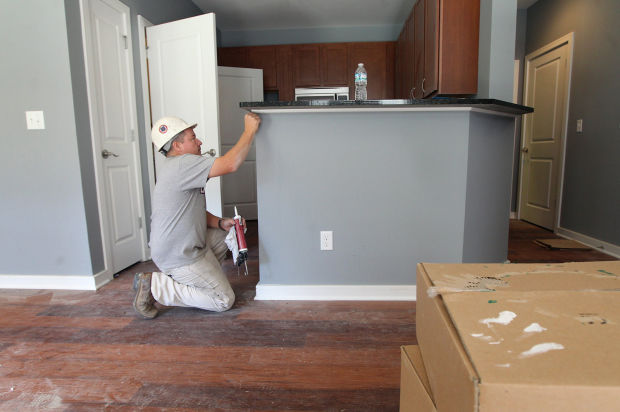15 tips on surviving a kitchen renovation
Tearing out the heart of your home requires a plan for how to survive the weeks to months of construction ahead.
If
your project is a basic tear out, plan on four to six weeks without
much access to the kitchen, but if you're doing a significant
renovation, expect at least three months of disorder.
Beyond
the decision-making and budget-making are things many people don't
prepare for: The overwhelming number of decisions required and eventual
decision fatigue, hitting the wall on prepackaged or carryout meals and
the emotional upheaval that comes with having the central part of your
home upended for weeks.
You need a plan of how you will
deal with the life details as well as choosing countertops, paint,
cabinets, flooring, tile and so forth.
Here are best tips on how to survive.
1. Set up a separate, temporary kitchen.
If
at all possible, move your current refrigerator to another room in the
house, where you can still access it. Otherwise, get a small college
fridge to keep the essentials. A spare microwave is also a critical
appliance.
Be creative with small plug-in appliances such
as a coffee maker or an electric skillet, which can be used to make
anything from pancakes to Hamburger Helper on it, said Kim Feld, a
kitchen designer with National Kitchen & Bath.
Consider getting a two-burner hot plate.
If
most of your trash and recycling was collected in the kitchen, move
temporary garbage cans to a place you can tolerate them. And be prepared
to take out the trash more frequently.
2. Find a place in your home to eat.
Consider the family room, where you can set up the fridge and microwave.
3. Realize you'll have to wash dishes in the bathroom.
Try to keep a sink hooked up on your main level during construction.
4. Add the cost of eating out into the renovation budget.
Figure
out how much your family typically spends on a meal eaten outside the
house. Multiply this by the number of meals in a day and weeks the
project may last. It's best to have a rotation in mind of reliable
carryout and prepackaged microwavable meals.
5. Prepare for noise and dust.
"It is messy. It is disruptive, and it can get expensive. There is no way around that," Feld said.
Jon
Kay, a manager at Signature Kitchen & Bath, said to expect
day-to-day interruption. "Plan on there being a mess every day."
6. Consider your pets.
If
you can ask a friend to take them, or have them kenneled, that might be
best. If not, give them extra attention, as the off-limits room and
noise will disturb them, too.
7. Get a sketch or design plans beforehand.
"Think
about how the kitchen is going to work from a function level," Kathy
Israel, owner of Accents on Cabinets, said. Also, think about where all
your current kitchen items and appliances will fit into the new kitchen.
It's best to include a professional in this sketching stage so they can let you know potential pitfalls.
8. Also consider hiring a designer.
Designers can be hired by the hour to help guide choices. This can save money and regret down the line.
9. Hire a general contractor carefully.
A good relationship with the general contractor is crucial, Mike Beck at Beck/Allen Cabinetry, said.
This
will be the point person you are spending the most time with, so find
out about how often he plans to communicate with you. Will he text or
email photos if you are out of town? How quickly will he return phone
calls? The worst kitchen nightmares are those that involve a contractor
who disappears or won't return calls.
In remodeling,
there are probably 50 things that can go wrong, and if you have a good
contractor, you may only know about two or three of them.
10. Be prepared for days when you don't see any progress.
Every
decision in a construction project involves a timeline. So, there will
be days of waiting — waiting for the countertops to be measured or
waiting for the backsplash to arrive.
11. Order as much as possible before the job starts.
Don't
start a project until all the decisions are finalized. As projects wear
on, people tend to be stressed and don't have time to pick out details
such as hardware quickly, which can slow down the entire project.
12. Expect some delays and cost overruns.
When
you get the estimates, it's wise to add 20 percent to that number and
ask yourself if you could still live with that number. If you don't have
that cushion, think twice about proceeding.
13. Don't sweat the small stuff.
"Trust
the people you've hired," said Jenny Rausch, president of Karr Bick
Kitchen & Bath. Ask their opinions. Don't second-guess yourself.
Don't agonize over the smallest details like hardware and countertop
edges.
Keep a sense of perspective. Homeowners can get
hyperfocused and paralyzed by decisions on the smallest details. Can you
really remember what the hardware and edges in your friends' kitchens
look like?
14. Get out of the house altogether.
If you can afford it, renting a short-term, furnished space is ideal.
15. Keep a sense of humor.
To order your copy of Remodeling Hell, CLICK HERE
For more information about Remodeling Hell, CLICK HERE
For more information about the Summit Murder Mystery series, CLICK HERE
Follow me on TWITTER
Friend me on FACEBOOK
Follow me on PINTEREST
